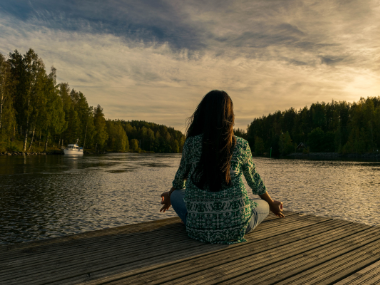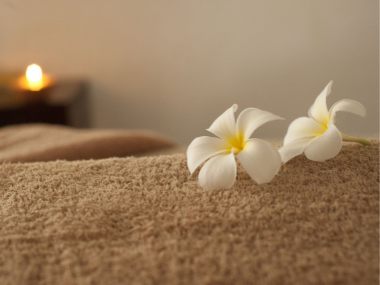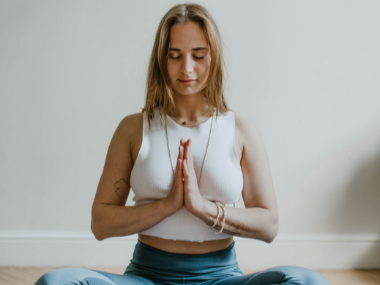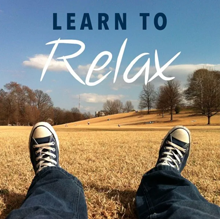
When you're stressed, calmness can feel completely out of reach.
For example, you might find yourself struggling with racing thoughts, along with physical symptoms of stress like sweating and muscle tension.
You'll know it's important to try and calm down, but in practice, it's not so easy. However, if you learn certain techniques in advance, you can deploy them when stressed.
In this guide, we'll look at the most powerful and effective ways to calm yourself down. We'll start by thinking about why relaxation is so important, and by looking at an overview of the major benefits relaxation practices have on the mind and body.
Finally, we'll look at four methods you can practice at home starting today - and how self-hypnosis can complement these methods to help you relax more than ever before.
The Importance Of Relaxation

We're constantly balancing family responsibilities with career aspirations, financial goals, and our social lives, so it's common for self-care to be left behind.
When you're busy, it can seem like every waking hour is over-scheduled, with no time left over to spend on things like hypnosis for relaxation.
Why should we relax, though, even when it's hard?
In sum, if we don't deliberately and regularly try to relax, we can end up in poor mental and physical health.
We need to create space to recover from everything we're dealing with in our day-to-day lives.
The Benefits Relaxation Has On Mind & Body

For example, when we're relaxed:
- Our blood pressure is lower
- Our heart rate is slower
- We are better at reasoning and making balanced decisions
- Our muscles are relaxed, reducing chronic pain
- We are more present in our relationships
- We more effectively resist triggers for stress
- We think more positively
- We have more physical energy
- We get better sleep.
Thanks to such benefits, relaxation makes us less likely to suffer from many different health problems, ranging from heart attacks and strokes to autoimmune diseases, depression, anxiety, and burnout.
Make How To Relax Easier With These 4 Methods

However, even with the best of intentions, we can struggle to get into the right mindset. So, let's now turn our attention to learning how to relax.
We'll explain how you can apply four different methods quickly and easily, and what you can expect to get from each of these methods.
Then, we'll take a look at what self-hypnosis can offer you, and how it can be a shortcut to a fully relaxed body and mind.
Breathing Exercises

Breathing exercises take very little time but they are fantastic at de-escalating your nervous system, slowing your heart rate, and reducing the production of stress hormones and cortisol.
All you need is 5 or 10 minutes to yourself to sit or lie down in a comfortable place.
Make sure you won't be disturbed, close your eyes, and place your dominant hand on your abdomen.
Inhale slowly while counting to three, then exhale slowly to a count of five.
Tune in to the feeling of your tummy expanding and contracting as you breathe, and repeat the exercise at least five times.
Start Gratitude Journaling & Writing Down Your Thoughts

If you're not sure how to journal, don't worry - it doesn't need to be complex. Simply write a few sentences or a short paragraph about what you're feeling and thinking, without editing yourself.
Give yourself permission to be creative, too, drawing in the journal as well as writing if the mood strikes you.
In addition, keeping a gratitude journal is another way to relax and elevate your mood.
In this journal, you list a group of things that make you feel grateful that day, which helps to shift you into a positive mindset.
Remember to focus not only on big things like a promotion or a new relationship but also consider small moments of beauty and pleasurable sensations.
When you need a quick boost, you can look back at the journal at any time.
Reconnect With Nature

It helps to alleviate stress and induce relaxation. Even just sitting in your garden or on a park bench for five or ten minutes can help you calm down when you're feeling overwhelmed.
If you like, you can combine this tip with the breathing exercise you learned above.
In addition, when you do have time, think about how you might most like to connect with nature.
For example, would it be worth spending a weekend by the sea? Is there a place you'd love to take nature photography or have a picnic with a friend?
All of these experiences can help your mood and are worth even more if you live most of your life in a busy city/
Use Visualizations

To try this technique, find a quiet place where you can be comfortable, and shut your eyes. Next, conjure up an image of your "happy place".
This can be somewhere you've visited sometime in your life, somewhere you'd love to go, or even somewhere that isn't real. The most important thing is just that place makes you feel calm and at peace.
Build up as much detail as possible.
Another approach to visualization is to build a vision board. This is essentially a collection of images and words that represent a goal of yours - in this case, to feel relaxed.
You might include images of places that relax you, things you need in your life to be happy, and words or quotes that help you connect with positivity.
Learn How To Relax With Hypnosis For Relaxation And Stress Relief

In addition, we've considered why it's vital to make room for relaxation in your life, for the health of your body and your mind.
However, if you're still struggling to relax or you'd just like to take your relaxation practices to the next level, try our hypnosis for relaxation program.
You’ll experience a deeply calm, reflective state of being, and you’ll begin to learn just how much control you can have over your own moods.


